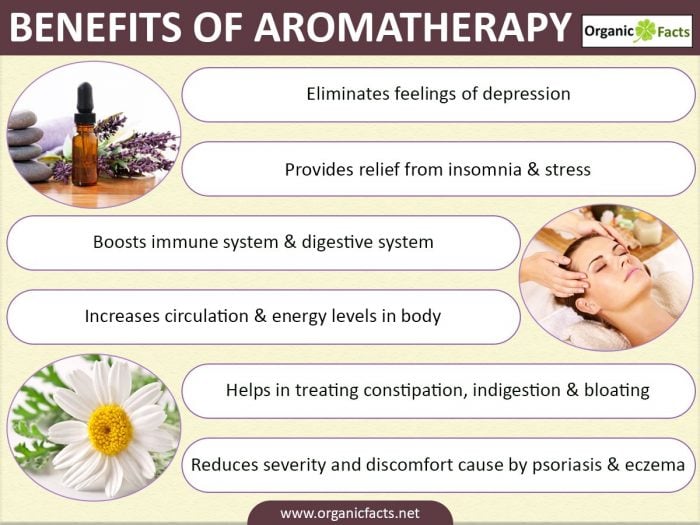Step into the enchanting world of aromatherapy, where scents hold the power to transform your well-being. From melting away stress to lulling you into a restful slumber, the therapeutic benefits of essential oils are undeniable. Let’s embark on a journey to discover the science behind these aromatic wonders and explore their myriad applications.
Whether you’re seeking tranquility, restorative sleep, pain relief, or a boost in your mood, aromatherapy offers a natural and effective solution. Dive into the fascinating world of essential oils and unlock the secrets of their healing powers.
Relaxation and Stress Relief

Aromatherapy, the practice of using essential oils for therapeutic purposes, has gained popularity as a natural remedy for relaxation and stress relief. The aromatic compounds in essential oils interact with the body’s olfactory system, triggering physiological and psychological responses that promote relaxation and reduce stress.
Inhaling certain essential oils, such as lavender, chamomile, and bergamot, can activate the parasympathetic nervous system, which is responsible for inducing a state of relaxation. These oils help slow the heart rate, lower blood pressure, and reduce muscle tension.
Physiological Mechanisms
- Limbic System Activation:Essential oil molecules bind to receptors in the olfactory bulb, sending signals to the limbic system, which is associated with emotions, memory, and behavior. Activation of the limbic system promotes relaxation and reduces anxiety.
- Neurotransmitter Release:Aromatherapy can stimulate the release of neurotransmitters such as serotonin and dopamine, which have mood-boosting and calming effects.
- Hormonal Regulation:Essential oils can influence the secretion of hormones like cortisol, which is associated with stress. Inhaling relaxing essential oils can help lower cortisol levels, promoting relaxation and stress relief.
Scientific Evidence
- A study published in the journal “Complementary Therapies in Medicine”found that lavender aromatherapy significantly reduced anxiety and improved sleep quality in patients with generalized anxiety disorder.
- Another study in the “Journal of Alternative and Complementary Medicine”showed that bergamot essential oil inhalation reduced stress and improved mood in healthy individuals.
Improved Sleep Quality
Aromatherapy offers a natural and effective way to enhance sleep quality and reduce sleep disturbances. Essential oils possess calming and sedative properties that can help promote relaxation and ease the transition into sleep.
Specific Essential Oils for Sleep
Certain essential oils are particularly effective for sleep enhancement:
- Lavender:Known for its calming and relaxing effects, lavender oil promotes deep sleep and reduces anxiety.
- Chamomile:Possesses sedative properties that can alleviate stress and induce relaxation, making it ideal for bedtime use.
- Ylang-ylang:Calms the nervous system and reduces stress, creating a peaceful and conducive environment for sleep.
- Vetiver:Grounding and calming, vetiver oil promotes relaxation and helps reduce sleeplessness.
- Bergamot:Uplifts mood and reduces anxiety, creating a sense of tranquility that can aid in sleep.
Tips for Using Aromatherapy for Sleep
To effectively use aromatherapy for sleep improvement, consider the following tips:
- Diffusion:Add a few drops of essential oils to a diffuser and place it in your bedroom an hour before bedtime.
- Bath:Add a few drops of essential oils to a warm bath and soak for 15-20 minutes before bed.
- Pillow Mist:Create a pillow mist by combining essential oils with water in a spray bottle. Spritz it on your pillow before sleep.
- Massage:Mix a few drops of essential oils with a carrier oil and massage it into your temples, neck, or feet before bed.
- Inhalation:Inhale essential oils directly from the bottle or use an inhaler for a quick and effective calming effect.
Pain Management
Aromatherapy has demonstrated promise in alleviating various types of pain, ranging from headaches to muscle aches. Its efficacy stems from the ability of essential oils to interact with the body’s pain-signaling pathways.
Essential oils possess anti-inflammatory properties that help reduce inflammation, a major contributor to pain. Additionally, certain oils contain analgesic compounds that block pain signals from reaching the brain.
Specific Applications
- Headaches:Peppermint oil, known for its cooling and analgesic effects, can be applied topically to the temples or forehead to relieve tension headaches.
- Muscle aches:Eucalyptus oil, with its anti-inflammatory and pain-relieving properties, can be massaged into sore muscles to promote relaxation and reduce discomfort.
- Arthritic pain:Ginger oil, possessing anti-inflammatory and antioxidant properties, can be used in a warm compress to soothe joint pain associated with arthritis.
Mood Enhancement
Aromatherapy has profound effects on our moods and emotions. Different essential oils possess unique properties that can uplift, calm, or energize us. By inhaling these volatile compounds, we stimulate the olfactory system, which has direct connections to the limbic system, the brain’s emotional center.
Certain essential oils, such as citrus oils (orange, lemon, grapefruit), are known for their uplifting and energizing effects. They promote feelings of joy, optimism, and alertness. In contrast, lavender and chamomile oils have calming and sedative properties, promoting relaxation, reducing stress, and improving sleep quality.
Specific Essential Oils and Their Emotional Benefits
- Bergamot:Uplifts mood, reduces stress, and promotes relaxation.
- Frankincense:Calms the mind, reduces anxiety, and promotes spiritual well-being.
- Ylang-ylang:Enhances mood, promotes relaxation, and acts as an aphrodisiac.
- Peppermint:Energizes the mind, improves focus, and reduces fatigue.
- Clary sage:Balances hormones, reduces stress, and promotes emotional well-being.
Health and Wellness
Aromatherapy has gained recognition for its potential to enhance overall health and well-being. Its therapeutic properties may extend beyond relaxation and mood enhancement, offering benefits such as boosting immunity, improving digestion, and reducing inflammation.
The scientific basis behind these claims lies in the volatile compounds found in essential oils. These compounds interact with the body’s physiological systems, influencing various biological processes.
Immunity Boosting
- Certain essential oils, such as eucalyptus, lavender, and tea tree oil, possess antimicrobial and antiviral properties.
- Inhaling these oils may help strengthen the immune system, reducing the risk of infections and illnesses.
Improved Digestion
- Aromatherapy can stimulate the digestive system, improving digestion and alleviating discomfort.
- Oils like peppermint, ginger, and fennel are known for their carminative effects, which help reduce gas and bloating.
Inflammation Reduction
- Essential oils such as turmeric, ginger, and chamomile have anti-inflammatory properties.
- These oils can help soothe inflammation in the body, reducing pain and discomfort associated with conditions like arthritis and migraines.
Closing Notes

As we conclude our exploration of aromatherapy benefits, it’s evident that these fragrant essences hold immense potential for enhancing our physical and emotional health. From relaxation and improved sleep to pain management and mood enhancement, the therapeutic applications of essential oils are vast and profound.
Incorporating aromatherapy into your daily routine is a simple yet powerful way to promote well-being and create a sanctuary of tranquility. Whether you prefer diffusing oils, indulging in aromatic baths, or applying them topically, the benefits of these aromatic treasures are within your reach.